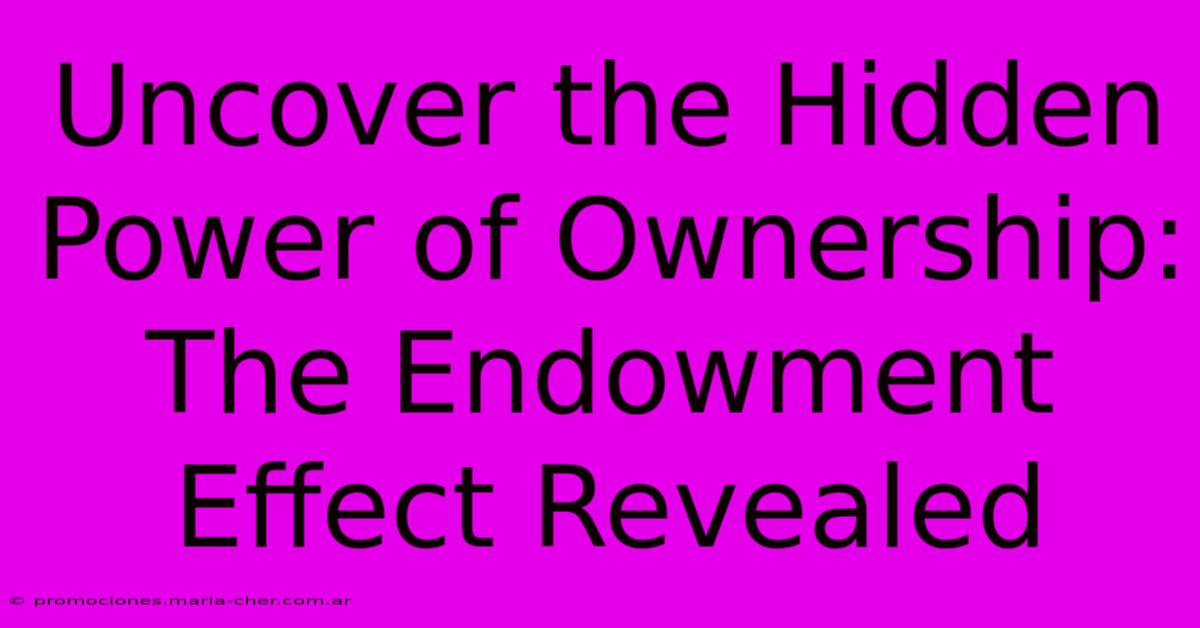Uncover The Hidden Power Of Ownership: The Endowment Effect Revealed

Table of Contents
Uncover the Hidden Power of Ownership: The Endowment Effect Revealed
Have you ever found yourself valuing something more simply because you own it? This isn't just a quirk of human nature; it's a powerful psychological phenomenon known as the endowment effect. Understanding this effect can unlock insights into consumer behavior, decision-making, and even negotiation strategies. This article will delve into the endowment effect, exploring its causes, consequences, and practical applications.
What is the Endowment Effect?
The endowment effect, also known as the mere ownership effect, describes the tendency for people to place a higher value on something they own, regardless of its objective market value. This means we're often willing to pay more to keep something than we would be willing to pay to acquire it. This seemingly irrational behavior has significant implications across various fields.
The Classic Experiment: The Mug Study
One of the most famous experiments illustrating the endowment effect involved coffee mugs. Participants were randomly assigned to one of two groups: those who received a mug and those who didn't. Those who received a mug were then asked how much they would sell it for, while those who didn't receive a mug were asked how much they would pay to buy one. Consistently, those who owned the mug demanded a significantly higher price than those who didn't own it were willing to pay. This disparity highlighted the power of ownership in shaping our perception of value.
Why Does the Endowment Effect Occur?
Several factors contribute to the endowment effect:
Loss Aversion:
This is arguably the most significant contributor. People tend to feel the pain of a loss more strongly than the pleasure of an equivalent gain. Giving up something we own feels like a loss, prompting us to demand a higher price to compensate for that feeling.
Cognitive Dissonance:
The endowment effect can also be explained through cognitive dissonance. If we've made a purchase or acquired something, we justify the decision by inflating its value in our minds. This helps reduce the dissonance between our actions and beliefs.
Psychological Ownership:
Even without physical possession, the feeling of ownership can trigger the endowment effect. This is often seen in situations where individuals feel a strong emotional connection to something, such as a cherished family heirloom or a piece of art.
Effort Justification:
The effort we put into acquiring something can also increase its perceived value. The more time, money, or effort invested, the greater the attachment and the higher the selling price.
The Endowment Effect in Action: Real-World Examples
The endowment effect plays a significant role in many real-world scenarios:
-
Negotiations: Understanding the endowment effect is crucial in negotiation. Knowing that the other party will likely value what they possess more than they would value acquiring something of similar value can help you tailor your approach.
-
Marketing and Sales: Marketers leverage the endowment effect through trial periods, free samples, and limited-time offers. Allowing consumers to experience a product fosters a sense of ownership, making them more likely to purchase it.
-
Environmental Conservation: People are more likely to protect or conserve resources they feel a sense of ownership over, even if that ownership is symbolic.
-
Real Estate: Homeowners often overestimate the value of their homes, influenced by the emotional attachment and investment they've made.
Overcoming the Endowment Effect
While the endowment effect is a powerful force, it's not insurmountable. Here are some strategies to mitigate its influence:
-
Objectivity: Consciously strive for objectivity when evaluating the value of something. Focus on market value and its utility rather than emotional attachment.
-
Perspective-Taking: Try to see the situation from another person's perspective. This can help detach your emotional attachment from the object.
-
Mindfulness: Be aware of your own biases and tendencies. Recognizing the endowment effect is the first step to overcoming it.
Conclusion: Harnessing the Power of Ownership
The endowment effect is a fascinating and powerful psychological phenomenon. By understanding its mechanisms and influences, we can navigate negotiations more effectively, make better decisions, and appreciate the subtle yet significant impact of ownership on our perceptions and behaviors. Whether you're selling a car, negotiating a deal, or simply making a personal purchase, understanding the endowment effect can give you a significant advantage.

Thank you for visiting our website wich cover about Uncover The Hidden Power Of Ownership: The Endowment Effect Revealed. We hope the information provided has been useful to you. Feel free to contact us if you have any questions or need further assistance. See you next time and dont miss to bookmark.
Featured Posts
-
Colourful Vs Colourful Which Spelling Is Correct
Feb 07, 2025
-
Conversion Magica Convierte Tus Imagenes Webp A Jpg En Segundos Sin Perder Nitidez
Feb 07, 2025
-
Breakthrough Innovation Printing Precision On Rolls 90640 With Our Game Changing Solution
Feb 07, 2025
-
Chromatic Symphony Of Baguette Hues A Sensory Exploration
Feb 07, 2025
-
Corporate Holiday Cards The Essential Guide To Building Stronger Relationships
Feb 07, 2025
